Seven Students Receive Mellon Mays Fellowships
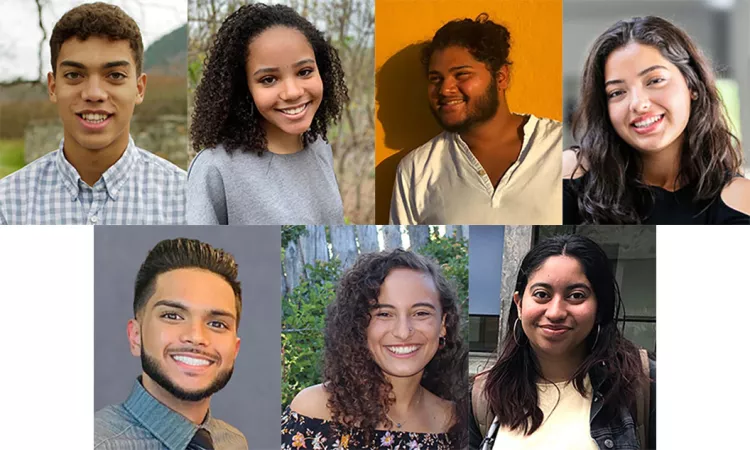
Clockwise from top left: Tristan Alston '22, Samantha Barnes '22, Anuk DeSilva '22, Fiorenza Herrera Diaz ’21, Sonia Linares '22, Sierra Sweeney ’21, and Murtaza Ukani ’22.
Seven Swarthmore students have been selected for the Mellon Mays Undergraduate Fellowship Program (MMUF), which aims to increase the number of minority students, and others with a demonstrated commitment to eradicating racial disparities, pursuing Ph.D. programs in core fields in the humanities and humanistic social sciences.
“The MMUF advisory committee was thrilled to receive 60 nominations for the fellowship this year,” says Assistant Professor of Peace & Conflict Studies and MMUF program coordinator Sa’ed Atshan ’06, who was also a Mellon Mays fellow as an undergraduate. “We selected this remarkable cohort of fellows for their outstanding applications, engaging interviews, and rich scholarly pursuits. We are convinced that, in time, they will become influential public intellectuals.”
The program provides fellows with a faculty mentor; stipends; access to MMUF programming, including an annual regional conference; and additional benefits if they enter a Ph.D. program within 39 months of graduation. The fellowship program, now in its 31st academic year, was established by the Andrew W. Mellon Foundation and initially involved eight charter members, including Swarthmore.
The 2020 Mellon Mays fellows include:
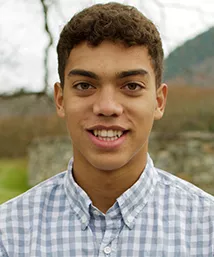
Tristan Alston ’22 (Housatonic, Mass.). Alston, a peace & conflict studies major, is interested in the intersection between peace & conflict and Black studies. Applying conceptual frameworks of post-conflict zones to the militarization of urban communities, he hopes to explore the ways in which recent uprisings and their militant suppression have impacted and transformed communities of color.
“Being accepted as a Mellon Mays Undergraduate Fellow is an incredible honor, and an opportunity I expect to be nothing short of transformational,” says Alston. “I’m excited not only for the resources and support I will be given in navigating the unfamiliar prospect and process of pursuing a Ph.D., but also for the future change that might be made possible through this fellowship and its commitment to diversifying academia.”
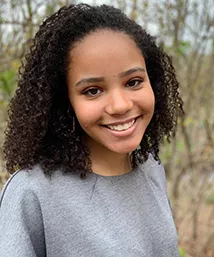
(Hopewell, N.J.). Barnes, a double major in peace & conflict studies and political science, is interested in researching how Négritude, a French literary and social movement developed in the 1930s, can be further applied in the Hispanophone Caribbean under a Black feminist framework to explore how multiculturalism and colonialism influence the formation of the Black Latina identity and consciousness.
“I’m so honored to have been accepted as a Mellon Mays Undergraduate Fellow and excited to be able to prepare my next steps in becoming a scholar in the pursuit of academia,” says Barnes. “This is an amazing opportunity to engage with the community and foster social change.”
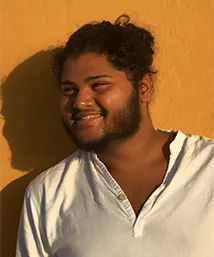
Anuk DeSilva ’22 (Garrison, N.Y.). DeSilva, a double major in peace & conflict studies and anthropology and diaspora studies, is interested in researching third gender South Asian identities and resistance. DeSilva hopes that, through representation and reclamation, this work will radically change academia and the experiences of other diasporic, queer, and third gender South Asian students and faculty.
“By supporting minority students who will pursue Ph.D.s and challenge academia’s representational disparities and their educational consequences, Mellon Mays is an invaluable chance for a queer, third gender, diasporic Sri Lankan student like me,” says DeSilva. “I want to change the fact that there are few queer or third gender South Asian tenured faculty on college campuses.”

(Wilmington, N.C.). Herrera, a transfer student from Miami Dade College (MDC), hopes to pursue a doctorate in sociology and teach at an institution similar to MDC, where she can mentor and inspire students from first-generation, low-income backgrounds similar to hers.
“I will be prepared to navigate the doctoral process through the resources Mellon Mays provides, such as guided research, mentorship, and workshops,” says Herrera. “I hope to be the link that can help my students succeed and inspire them with my story so that they see themselves at institutions like Swarthmore. As these students advance their education, they will begin to take on careers in fields like academia where there is presently a lack of diversity.”
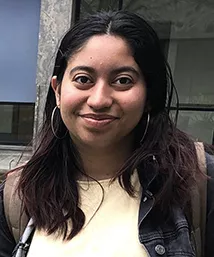
(Los Angeles, Calif). Linares is a double major in history and peace & conflict studies. Her primary research interests include analyzing the correlation between mass deportations of gang members in Los Angeles in the early 1990s and present-day gang violence in El Salvador. She hopes to center her research around how individual communities within El Salvador are combating gang violence through a restorative lens, in opposition to state-led punitive measures that continue to be taken in the country at large.
“I look forward to working with mentors, engaging in critical conversations about research, and receiving feedback and support from mentors and peers on how to best tackle larger questions,” says Linares. “Upon graduating from Swarthmore, I hope to continue studying postwar violence and community engagement in El Salvador through an interdisciplinary program.”
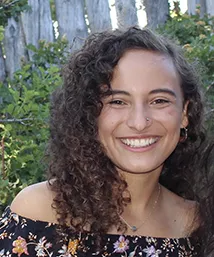
(Santa Fe, N.M.). Sweeney, a double major in history and English literature, is interested in researching the historic and literary narratives of Indigenous and Hispanic women of the Southwest. Through this work, she hopes to bring greater attention to grassroots activism and the missing and murdered Indigenous women epidemic by highlighting women as key storytellers and leaders in their communities.
“This summer, I will be doing archival research and interviews with grassroots organizations run by and for Indigenous women,” says Sweeney. “Through my research and the works of Black and Indigenous theorists such as Saidiya Hartman and Sarah Deer, I hope to use this opportunity to show how contemporary Indigenous women are combating generational trauma and institutional inequalities.”
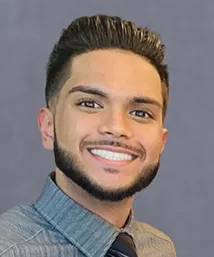
(Skokie, Ill.). Ukani is a double major in sociology & anthropology and peace & conflict studies who intends on concentrating in economic anthropology. His primary research interests include tracing transoceanic commercial, economic, and cultural exchanges in the Indian Ocean basin between the Swahili Coast, Arabian Peninsula, and western India.
“I am profoundly thankful to the professors who encouraged my pursuit of the fellowship and met my intellectual curiosities with open arms,” says Ukani. "Mellon Mays will be instrumental to my studies at Swarthmore and plans for graduate school. I find strength in knowing I will be surrounded by a community of engaged scholars who are invested in transforming academia.”
To learn about Swarthmore’s commitment to access and inclusion, visit lifechanging.swarthmore.edu.



